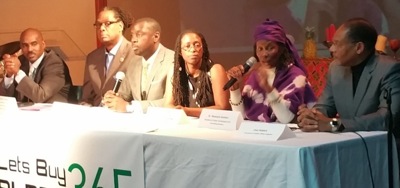Panelists: Muhammad, Cornegy, moderator Grant, Kambon, Dr. Kambon and Riddick. Photo: Black Star News
[Publisher’s Commentary]
No one was there to blame anyone about the many challenges facing African American communities–the message, Tuesday evening, was about empowerment through individual actions.
A group of entrepreneurs, educators, and an elected official at a news conference announced the launch of LetsBuyBlack365 a movement anchored by a website that promotes Black-owned businesses, educates consumers and offers a platform for circulating the $1.1 trillion in African-American purchasing-power within the community.
“The time is now,” said Nataki Kambon, who doubles as a spokesperson for LetsBuyBlack365 and is one of the brainchilds behind its creation. “Everyday, starting January 1, for 365 days, buy Black.”
Individual actions and choices Kambon said includes “I can spend where I spend my money” and “what type of organization gets my patronage.”
Kambon says the timing of the launch wasn’t coincidental. It comes at a time when many African Americans are disappointed by decisions in recent high-profile incidents of police brutality, such as the case of 12-year-old Tamir Rice and that of Sandra Bland, where grand juries didn’t return indictments against the officer involved.
Meanwhile, nationally, students have been protesting racism on university campuses around the country.
Black economic empowerment –supporting Black-owned businesses and job creation in African American communities– would also lead to political empowerment and the ability to impact the education system and demand for equity in housing and resource distribution, Kambon and the other speakers said.
According to its website, LetsBuyBlack365 is a “nationwide Black economic empowerment movement, online Black community, and local network. This is a movement to empower Black people through the committed Black owned businesses that create jobs, create resources, and fuel our communities as they grow.” The website has also posted a video with audio of iconic Black leaders –Marcus Garvey, Dr. Martin Luther King, Jr., and Malcolm X– all of whom were advocates of economic empowerment.
The launch was announced at Rev. Dennis Dillon’s church, The Brooklyn Christian Center, at 1061 Atlantic Avenue, in Brooklyn, with a panel presentation that included Kambon’s and four other presenters. The moderator was Joseph Grant, an arts and culture ambassador in New York City Council member Robert E. Cornegy Jr.’s office; the council member was also a panelist.
Kamose Muhammad, president and ceo of Freedom Paper Company and panelist elicited some good laughs when he asked anyone in the audience who didn’t use toilet paper –his four year old company’s product– to raise her or his hand. Muhammad said African American consumers could learn from how the Chinese support their businesses. So long as the quality is good and the prices reasonable, their motto, Muhammad said is “we must buy it.”
Chet Riddick, president of Philadelphia-based Alpha Office Supplies, a company founded four decades ago urged Black entrepreneurs to focus on wealth-building businesses, that endure and help create wealth for its employees, rather than those that focus on life-style. He said his company’s founder, who was a good friend of his adopted an empowerment strategy from the very beginning and also hired people “who wouldn’t be hired downtown,” including ex-offenders.
Alpha, a $40 million company, continues the tradition of helping small business owners by assisting them with the often confusing and time-consuming task of completing Requests for Proposals (RFPs), which are required in almost all cases to win a contract from a municipal, state or federal agency. Alpha has posted an instructional video on YouTube.
Riddick says the Movement isn’t just about getting African Americans to spend with Black-owned businesses but to get all consumers to patronize these businesses.
Council member Cornegy decried New York City’s abysmal record in spending with Black owned businesses and cited a recent report by City Comptroller Scott M. Stringer. The report “Making The Grade” which has focused pressure and scrutiny on the Bill de Blasio administration found that less than 1% of the nearly $14 billion that New York City spends annually with vendors and contractors went to Black and Latino-owned businesses.
The two ethnic groups make up more than 52% of the population of New York City. Cornegy, who chairs the committee on small businesses in the City Council said he’s now focusing on taking the available services to all the five borroughs including information on how these businesses can access millions of dollars in funding.
Dr. Mawiya Kambon, who is Nataki’s mother was also a panelist. She’s president of Onipa Psychological and Consulting Services and said African Americans find it challenging to redirect their spending patterns because it had been conditioned over decades by national advertising and marketing campaigns.
She said unless Black people “regained their minds” they wouldn’t succeed in adopting empowering spending patterns.
Rev. Dennis Dillon, who is also publisher of The Christian Times, helped close the discussion, and noted that he would patronize the businesses owned by the panelists, including purchasing toilet paper from Freedom Paper, giving it’s ceo Muhammad the last laugh.
The individual companies represented on the panel, and many others can be reached through LetsBuyBlack365.com





